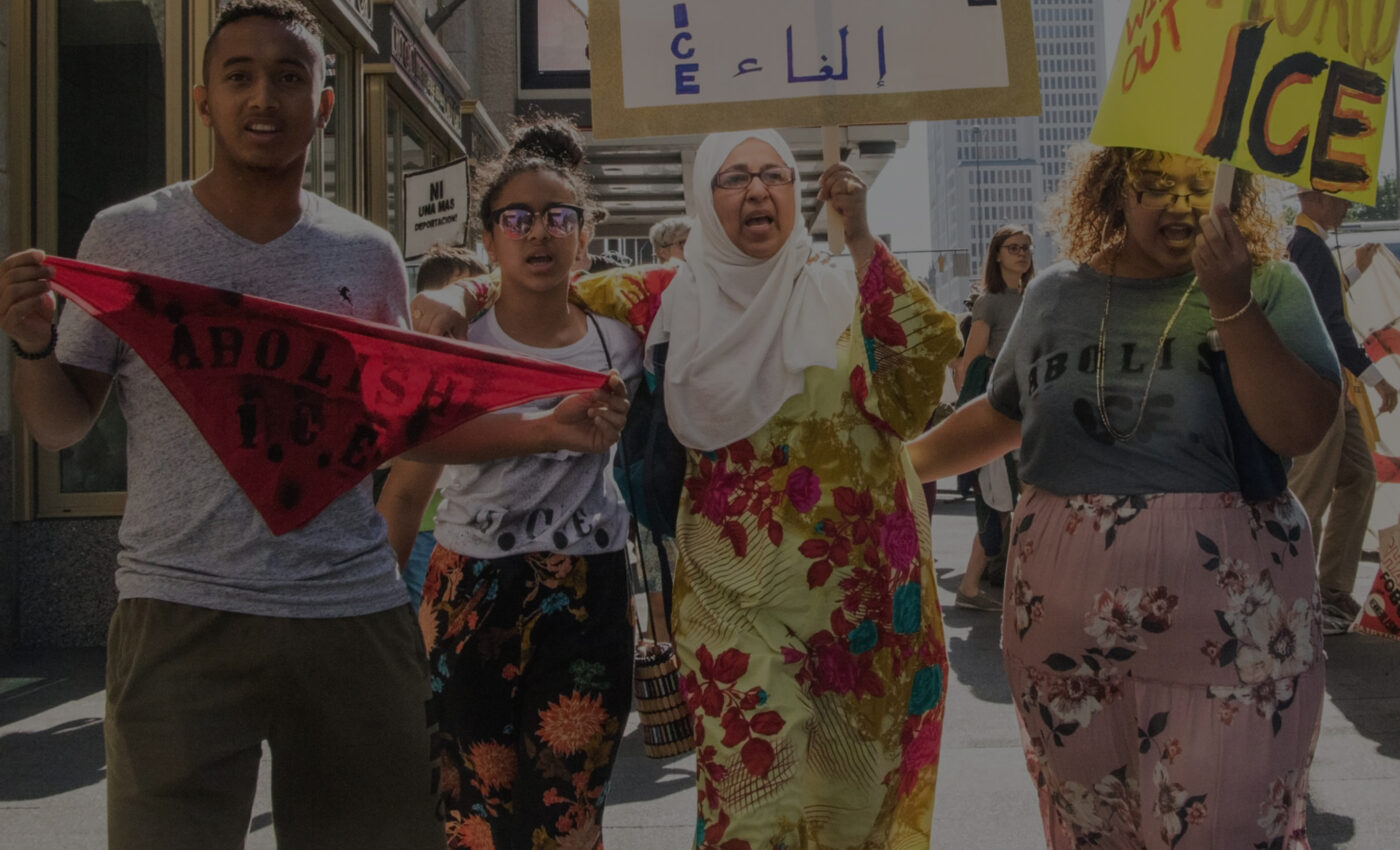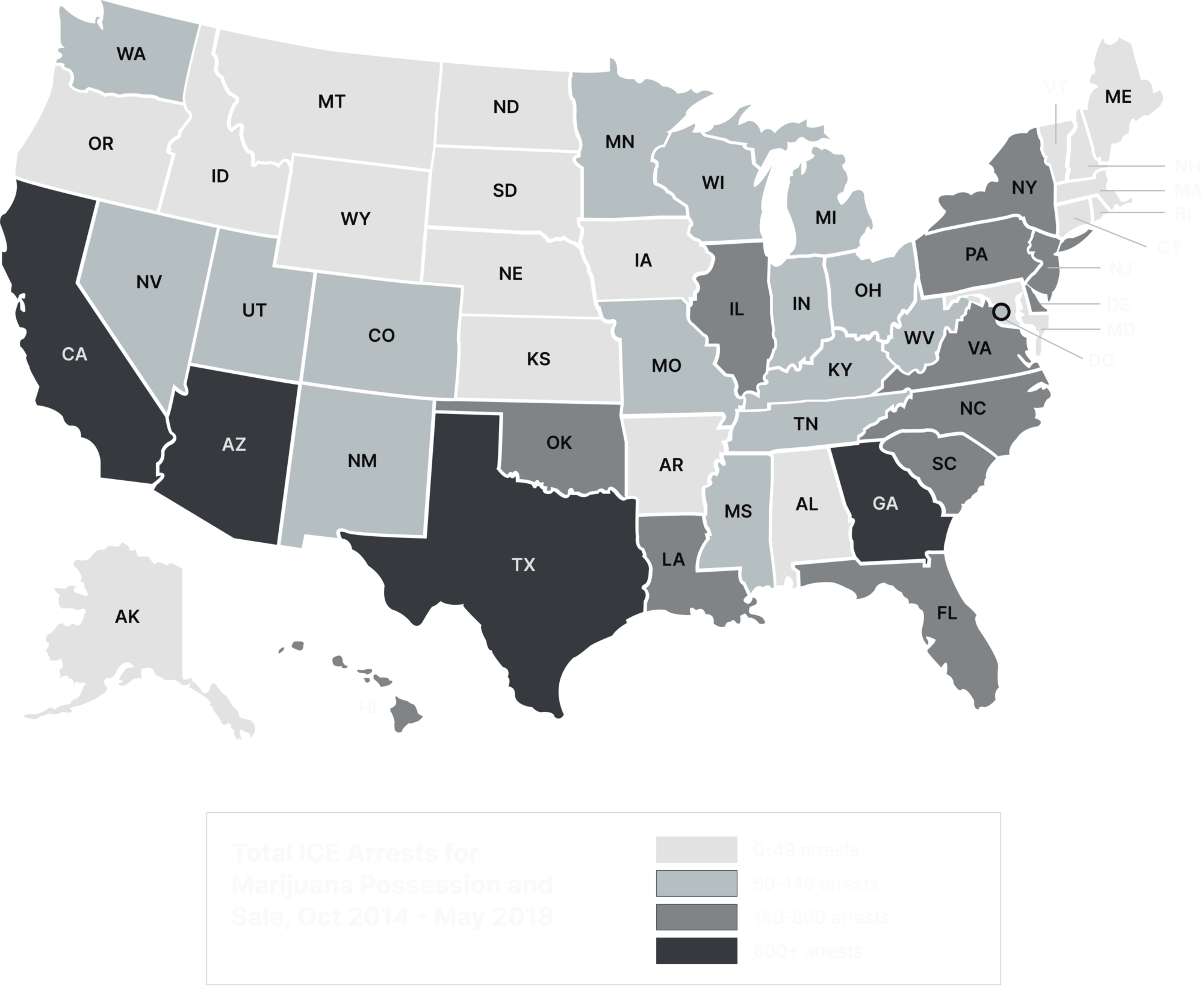
Drug policy and immigration policy have been an insidious pair in the United States since the country’s first drug control laws. As early as 1875, drug laws stoked anti-Chinese hysteria by depicting Chinese men as “opium addicts.” Anti-immigrant policies continued into the 20th century, and the drug war ramp-up in the 1980s and 1990s formally tied drug war logic to immigration policy, explicitly targeting non-citizens for drug involvement. Since then, nothing has changed.
Irrational and racist logic rooted in the drug war falsely associates Latinx and Black immigrants with drug use and drug activity. As a result, the U.S. has created the largest immigrant exclusion, detention, and deportation structure in the world. Drug use is often the reason for removing immigrants or denying them access to services, particularly Latinx and Black undocumented immigrants and green card holders. Drug war thinking has led us to surveilling immigrants, turning anything related to drugs into a severe crime, deporting people in record numbers, and enacting harsher punishments on non-citizens.
The drug war has its roots spreading throughout our lives, arbitrarily upending the lives of immigrants, sowing fear and anxiety in neighborhoods, and tearing apart families. It’s still spreading — and we can do something about it.
The Roots of the Drug War Go Everywhere
Though criminalization of drugs and immigration restrictions have been formal immigration policy for over a century, both were greatly ramped up in the 1980s and 1990s. Now, many drug law violations, including violations many people would consider minor, like the sale of $10 worth of drugs, subjects non-citizens (including green card holders) to mandatory immigration detention and deportation, and makes people ineligible for lawful status or asylum — punishments significantly harsher than those U.S. citizens would be subjected to.
Punishments significantly harsher than those U.S. citizens would be subjected to
The drug war is at the center of our deportation machine. Offenses involving drugs are among the most common reasons for Immigration and Customs Enforcement (ICE) arrests. In fiscal year 2019, ICE made over 67,000 arrests for non-traffic drug offenses. Non-citizens who have been convicted of drug offenses may be subject to mandatory detention in immigration detention facilities without bond hearings while waiting for possible deportation. After illegal entry, drug offenses were the most common cause of deportation in 2019.
The drug war is at the center of our deportation machine
When many people are charged with a criminal offense, they have no better option than to accept a plea deal in order to avoid a trial. Nationwide, 97% of people accept plea deals. Many non-citizens do so without knowing or understanding the immigration consequences of a conviction that they accept as part of a plea deal, which can result in them being torn from their family and community and exiled to another country. Diversion programs intended to shield people from drug convictions do not always shield them from federal immigration consequences, so even successful completion of the program can still result in immigration enforcement. And, most states do not have mechanisms to expunge criminal convictions to prevent their consideration for immigration purposes. Once a conviction occurs, many non-citizens are subject to cruel immigration policies and enforcement, which can occur at any point and without notice.
Torn from their family and community and exiled to another country
U.S. prohibition creates an illicit market that relies on drug production and supply from regional countries. A great irony is that the U.S.’s international drug policy and drug interdiction contributes to the violence and instability in Latin American countries that drives many people to immigrate to the U.S. With no support and subject to criminalization, non-citizens are often sent back to the dangerous circumstances they were originally fleeing. Immigrants who use drugs are less likely to receive the adequate healthcare, treatment, and public health services to address their needs after being deported from the U.S.
Non-citizens are often sent back to the dangerous circumstances they were originally fleeing
Dig deeper to see how these systems are connected.
Despite having lived in the U.S. since the age of eight as a legal permanent resident, and despite having served in the Army with two deployments to Afghanistan, Miguel Perez, Jr. was deported back to Mexico in 2018 because of an earlier drug conviction for which he had already served time. Living in Tijuana, Miguel was separated from his two children and extended family and suffered from symptoms of post-traumatic stress disorder (PTSD) stemming from his military service — the very symptoms that had caused him to start using drugs. The drug war fuels the deportation regime, ripping apart families and destroying lives.
Miguel Perez, Jr.
Chicago, IllinoisThe Drug War Grows Unchecked
As people recognize the harm of marijuana prohibition, more states have legalized and decriminalized marijuana for adult use. Because federal law still defines marijuana as a prohibited controlled substance, non-citizens living in these states continue to face immigration consequences at the federal level. In states where marijuana is legalized or decriminalized, ICE arrests continue, and immigrants can face the disproportionate, devastating consequences of detention and deportation.

The word “conviction” means the same thing for U.S. citizens and non-citizens living in the United States.
Immigration law counts some offenses as convictions for deportation purposes, even if the state does not consider the offense to be a conviction. For example, New York has decriminalized some marijuana possession offenses by making them violations. But these offenses continue to be considered drug convictions, which under federal immigration law carries harsh consequences, like deportation and ineligibility for legal status.
Pull the Drug War Up by the Roots
U.S. immigration policies cruelly tear families apart and often send people back to countries where they have no support. The drug war, with its deep ties to xenophobia, has fueled mass detention and deportation. Drug policies should not be used as a weapon to discriminate against, deport, or punish immigrants.
We Should:
We can uproot the drug war from our communities.
It Takes All Of Us
Get involved in the grassroots movement to uproot the drug war in all systems.